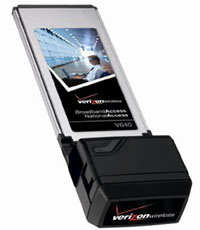Novatel V640 EVDO card and why you want one (updated)


The V640 was announced in August 2006 by Verizon Wireless and Novatel Wireless and is a WWAN PCI ExpressCard/34. The V640 is only for use with Verizon Wireless’ BroadbandAccess service and enables owners of notebooks with ExpressCard/34 (and ExpressCard/54) slots to wirelessly connect to the Internet at broadband speeds via Verizon Wireless’ national high-speed 3G Evolution-Data Optimized (EV-DO) network.
The little card is an amazing piece of kit offering download speeds that rival my clunky DSL connection at home and even the pokey "high speed" connections at a lot of hotels. I used this little wonder to live blog the Stevenote address at Macworld Expo in January and although I had a little trouble with the software, all was cured with a quick update to the latest version of VZAccess Manager (v.3.1.3 currently). Be sure to update to the latest version of the software. You should also install Apple's WWAN Support Update 1.0 for Intel based Macs while you're at it.
VZAccess Manager is an OS application for managing your connection on Verizon’s BroadbandAccess network. The software offers information about your data usage and is useful for keeping tabs on the amount of data transferred to and from your computer.
Although their BroadbandAccess service is marketed as "unlimited" Verizon has been known to cancel user accounts for transferring more than 5GB of data per month. EVDOForums.com has posts from several Verizon customers that had their EV-DO accounts canceled for that very reason.
When I asked Verizon Wireless about their usage policy and the conflict between marketing a product as "unlimited" access and the phantom 5GB download cap, their Executive Director of Corporate Communications replied "we have a BroadbandAccess plan that is UNLIMITED FOR certain types of use, not just "Unlimited." Right.
Anyway, bandwidth caps notwithstanding the V640 is still an amazing card. Business users will love being able to get online in seconds in most major metros without having to hunt around for an open WiFi hotspot or pay for an expensive T-Mobile hotspot account. It's great to be able to keep in touch with the office and clients whether you're in the airport or in the back of car doing 70MPH down Interstate 95. Granted the service isn't cheap (US$60 per month with a VZW mobile phone account) nothing beats being able to get online with your MacBook Pro in most major metros, especially now that spring is almost here.
Verizon Wireless sells the ExpressCard V640 for US$179 with a two year contract. The "unlimited" broadband service costs US$59.95 per month if you have cell phone service with Verizon.
UPDATE: Verizon today announced the V740 Rev A ExpressCard/34 that replaces the Novatel V640 Rev 0 ExpressCard/34. MacBook Pro users can use the included VZAccess Software or use the latest Apple WWAN Update. Rev A is superior to Rev 0 EVDO in terms of speed, according to Wikipedia:
EV-DO Rev. A is becoming the successor to the first revision of the standard, EV-DO Rev. 0... Rev. A offers fast packet establishment on both the forward and reverse links along with air interface enhancements that reduce latency and improve data rates. In addition to the increase in the maximum downlink rate from 2.45 Mbps to 3.1 Mbps, Rev. A has a significant improvement in the maximum uplink data rate, from 153 kbps to 1.8 Mb/s. This improvement assumes early acknowledgment of the first subpacket, typical data rates therefore average below 1 Mbps